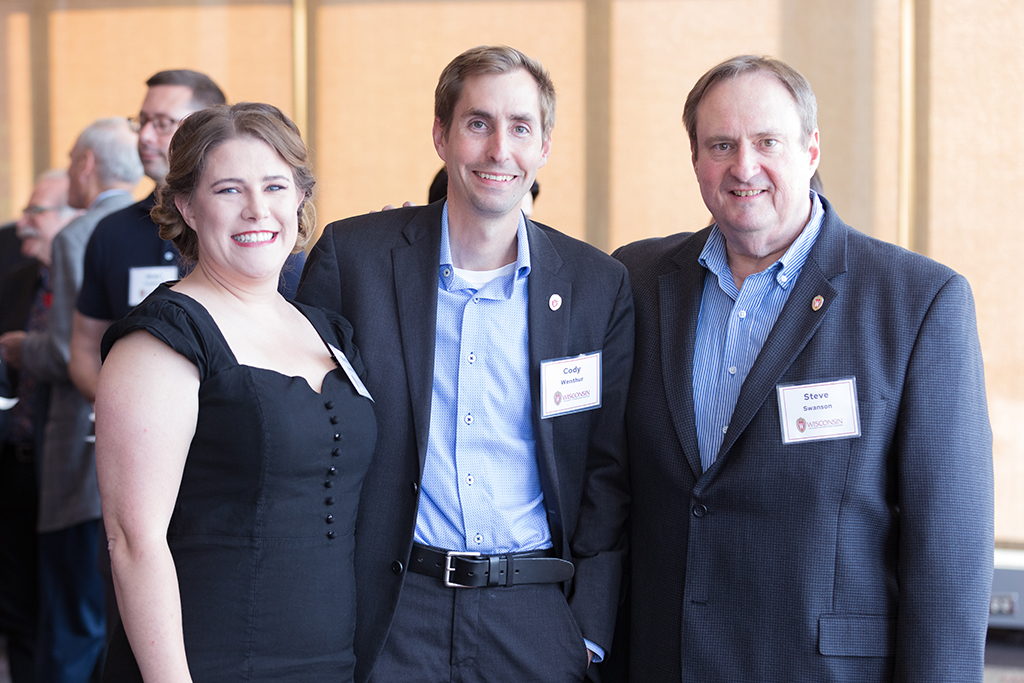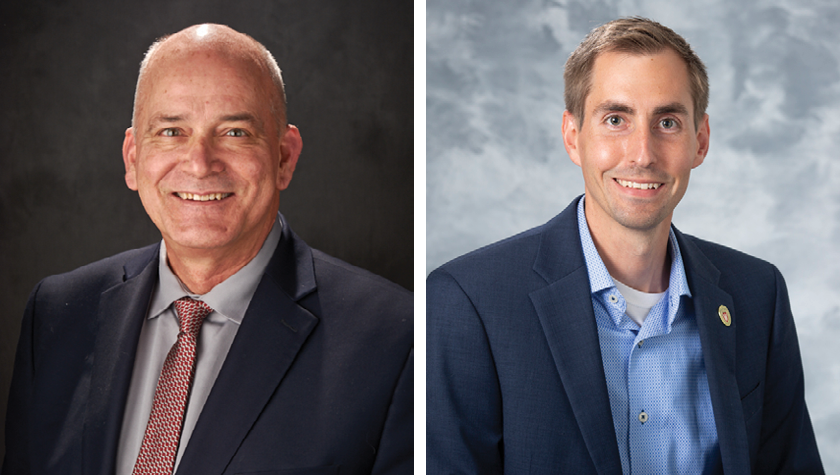Wenthur has been selected for one of UW–Madison’s highest faculty honors
By Katie Ginder-Vogel
“When I applied to be a faculty member at the University of Wisconsin–Madison, I noted that I grew up in Wisconsin and wanted to work here to contribute to the future of higher education in the state, and I meant it,” says Cody Wenthur.
Wenthur, assistant professor in the Pharmacy Practice and Translational Research Division (PPTRD), joined the faculty at the UW–Madison School of Pharmacy in 2018. In his five years at the School, he has become a nationally respected expert in the field of psychedelic medicine. He is the director of the School’s first-of-its-kind master’s degree program in Psychoactive Pharmaceutical Investigation and an executive board member for the UW Transdisciplinary Center for Research in Psychoactive Substances, also housed within the School.
This year, Wenthur has earned another achievement: He’s been selected for a Vilas Early Career Investigator Award from UW–Madison. The Vilas awards and professorships are some of UW–Madison’s most prestigious honors. Named after former UW–Madison law professor William F. Vilas — who served as a UW regent, a U.S. senator, and the U.S. Secretary of the Interior — they recognize faculty who’ve made exceptional contributions to their fields.
Wenthur joins the ranks of five other current School of Pharmacy faculty to hold the distinction: Associate Professor Warren Rose, also of the PPTRD, as well as Professor Weiping Tang, Assistant Professor Jiaoyang Jiang, Professor Lingjun Li, and Professor Jeff Johnson, all of the Pharmaceutical Sciences Division, have also received Vilas honors.
“I’m thrilled and very humbled to receive this award,” says Wenthur. “It is really incredible to get this recognition and see that I am hopefully making an impact.”
Groundbreaking research
Wenthur, who earned his PharmD from Purdue University and his PhD in pharmacology from Vanderbilt University, was a postdoctoral research fellow in the Scripps Research Institute’s Department of Chemistry when he started his work on small-molecule vaccines against drug abuse in the lab of Kim Janda.
His research group — which includes seven graduate students, two staff members, and several PharmD students and undergraduates — takes an interdisciplinary approach to the development of new tools and therapeutic approaches for understanding and treating psychiatric illnesses.
“I’m thrilled and very humbled to receive this award. It is really incredible to get this recognition and see that I am hopefully making an impact.”
—Cody Wenthur
“The successes we’re having in my lab would not be possible without the dedication and efforts of the graduate students, undergraduates, postdocs, and scientists that make it happen, and my incredible colleagues and collaborators here at UW–Madison and beyond, who are so gracious with their time, energy, and efforts,” Wenthur says.
The Wenthur Lab’s pre-clinical and clinical research projects focus on three core areas: applying vaccines and small molecules as countermeasures for drug misuse, understanding how rapidly acting antidepressant compounds (such as ketamine and psilocybin) work in the brain, and addressing barriers to the implementation of next-generation psychiatric treatment approaches.
Wenthur was awarded a four-year $2.3 million R01 grant from the National Institutes of Health in 2021 to lay the groundwork for innovative treatments for people living with depression by using an incremental vaccination approach method to understand how ketamine and its metabolites work, in order to create a more effective therapeutic.
“We continue to be excited about the technologies we’re developing — selective antibodies against ketamine and its metabolites, to identify active mechanisms for ketamine as a rapidly acting antidepressant,” says Wenthur. “We have selective antibodies in hand, so now, we’re applying those to look at ensembles of neurons activated by hydroxynorketamine. With immunostaining, we can count millions of neurons being activated following different drug treatments and identify the brain regions lighting up under each one.”

Through the Vilas award, Wenthur plans to continue generating critical preliminary data for his lab’s investigations of the mechanisms of action of psilocybin, DMT, and other psychedelics. One of the studies currently underway is testing whether the psychedelic experience of psilocybin is necessary for patients to gain therapeutic benefits.
“We’ve had exciting results and publications from our psychedelic work,” Wenthur says. “We’re looking to take the next step and secure a large grant to continue it. Being able to get those compelling preliminary data will be a key difference maker.”
In 2021, Wenthur and his co-investigators from the School of Pharmacy — Professor Paul Hutson of the Pharmacy Practice and Translational Research Division and Associate Professor Olayinka Shiyanbola of the Social and Administrative Sciences Division — received a grant from the Wisconsin Alumni Research Foundation (WARF) to complete at two-year study to increase representation in clinical studies. Wenthur has spent the two-year study exploring the influence of the clinical space’s art on the recruitment and retention of minority populations in psychedelic studies. He has also connected with diverse groups of community members to understand the barriers to the enrollment of non-white study participants.
“We’re still collecting info from folks coming to do psychedelic-assisted therapy trials,” says Wenthur. “Thanks to the WARF grant, we have the ability to offer them an expanded digital library of art for the room, sourced with community partners around Madison and local artists. We’re trying to use that to improve the everyday experience and comfort of folks in these trials, to make the studies as accessible and beneficial as possible to people of all social identities and backgrounds.”
“The ultimate goal of the research is to help researchers design their studies and clinical trials to be equitable and attract a greater diversity of participants, leading to more effective therapies being made available to more patients,” says Wenthur.
Drive to learn
The motivation that keeps Wenthur in the lab is simple, and it’s one that got him started on the research path to begin with.
“The question that animates my scientific interests is how small molecules can change people’s behavior over the long term,” Wenthur says. “Getting the answer to that question continues to be a really fun and challenging journey, and it’s those things in equal measure that keep me coming back into the lab.”
In addition to his research group’s projects, Wenthur has gotten immense satisfaction from founding and directing the School’s groundbreaking Psychoactive Pharmaceutical Investigation master’s degree program.
“The question that animates my scientific interests is how small molecules can change people’s behavior over the long term.”
—Cody Wenthur
“It’s been extremely gratifying to see that program succeed and grow to enroll more than 100 students in its first two years,” he says. “Our first graduates are moving on to their own careers this year. It surprised even me by how quickly it grew and how much impact that has from an educational perspective.”
Wenthur’s main motivation for becoming a professor — to improve higher education and help the people in Wisconsin — remains true.
“I certainly want to keep my hand in any projects that advance the mission of the university through outreach and impact the lives of people across Wisconsin and beyond,” Wenthur says. “Research is one of those things for me, and being able to found and direct a master’s program to train researchers to explore new ground in this important therapeutic area is another one.”
